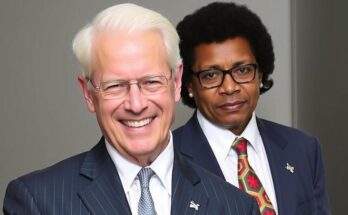Erik Solheim describes the NPP’s recent electoral victory as a “seismic shift” in Sri Lankan politics, signifying a strong rejection of the traditional political elite. The NPP’s success, particularly among Tamil voters, indicates a desire for improved ethnic relations and accountability in governance. Solheim emphasizes the need for the NPP to address corruption and establish inclusive economic policies to maintain support and sustain a transformative governance model.
Erik Solheim, a former Norwegian peace facilitator with extensive experience in Sri Lanka, characterized the recent landslide victory of the National People’s Power (NPP) in the November 14 elections as a seismic shift in the political landscape of the country. The NPP, helmed by Anura Kumara Dissanayake, not only achieved significant electoral success but also symbolized a potent rejection of the long-standing Colombo-centric political elite. Solheim noted that this overwhelming support, especially from Tamil-majority regions, signifies a deep-seated desire for improved ethnic relations, as well as an urgent demand for government accountability and an end to corruption. Solheim acknowledged the NPP’s unconventional rise, highlighting its roots in traditionally Sinhalese areas while managing to secure broad support among Tamil voters in the north and east. He expressed that, if the NPP effectively addresses the needs of these communities, it may herald a transformative moment in Sri Lankan politics, fostering a new era of cooperation and peace. Furthermore, he emphasized that the NPP must tackle the challenge of corruption and establish economic policies that resonate with the masses to maintain their support and evolve into a stable governing entity. Solheim reiterated that while many incumbent leaders possess good intentions, they have collectively failed to uplift Sri Lanka compared to its regional peers. He warned that for meaningful progress to occur, the government must prioritize an inclusive approach, melding the needs of various ethnic groups and establishing equitable prosperity across the board. Solheim cautioned that a failure to embrace such inclusive policies could hinder the NPP’s long-term success, urging that the party must navigate carefully to fulfill the aspirations of all Sri Lankans while rebuilding trust in governance.
The National People’s Power (NPP) recently gained unprecedented electoral success in Sri Lanka, signaling a dramatic shift in the political dynamics of the nation. Led by Anura Kumara Dissanayake, the NPP emerged not only from the Sinhalese heartland but also managed to capture significant support from Tamil voters in traditionally polarized regions. This success has drawn attention from international observers, including Erik Solheim, who has spent years engaging in Sri Lankan peace processes. The backdrop of this electoral change is rooted in years of corruption and ethnic friction, necessitating a new political approach if genuine reconciliation is to take place. As Sri Lanka grapples with the aftershocks of an economic downturn, the electorate’s disenchantment with established political parties propelled the NPP into a position of prominence. The NPP’s agenda focuses on addressing issues of governance and advocating for economic development that considers the needs of all ethnic groups, particularly amidst calls for greater autonomy and equal rights from Tamil and Muslim communities.
In conclusion, Erik Solheim’s insights into the NPP’s remarkable electoral victory underscore the profound implications this has for Sri Lankan politics. The significant support garnered from Tamil regions signals a strong demand for new beginnings and enhanced ethnic relations. However, Solheim cautions that the NPP must address corruption and prioritize inclusive economic policies to solidify this support and foster a lasting political transformation. Ultimately, the NPP’s ability to navigate these challenges will determine whether this political shift represents a new era or merely a temporary change in government.
Original Source: thefederal.com



